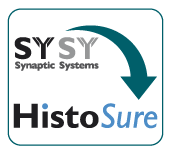|
|
|
|
| Cat. No. HS-398 117 |
200 µl purified IgG, lyophilized. Albumin and azide were added for stabilization. For reconstitution add 200 µl H2O. Then aliquot and store at -20°C to -80°C until use. Antibodies should be stored at +4°C when still lyophilized. Do not freeze! |
| Applications | |
| Clone | 311H2 |
| Subtype | IgG2b (λ light chain) |
| Immunogen | Synthetic peptide corresponding to AA 1234 to 1252 from mouse Ki67 (UniProt Id: E9PVX6) |
| Reactivity |
Reacts with: mouse (E9PVX6). No signal: human (P46013), rat (D4A0Y6). Other species not tested yet. |
| Remarks |
IHC: Heat-mediated antigen retrieval (in citrate buffer pH 6) is required for immunohistochemical staining. |
| Data sheet | hs-398_117.pdf |
 Important information
Important information|
|
Expression of the nuclear protein Ki 67 is strictly associated with cell proliferation and preferentially expressed during the late G1, S, G2 and M phases of the cell cycle. Resting cells (G0 phase) lack Ki 67 expression .
Immunohistochemical detection of Ki 67 is a simple and reproducible method to determine the tumour proliferative index and is a predictive and prognostic biomarker in certain types of human cancer, such as breast cancer, gastric cancer or prostate cancer. Moreover, higher Ki 67 scores may be associated with increased tumor sensitivity to radiation therapy and chemotherapy.
In preclinical and clinical studies Ki 67 expression is used as a pharmacodynamic biomarker. Absence of a decrease in Ki 67 early in treatment might be predictive of therapeutic failure.